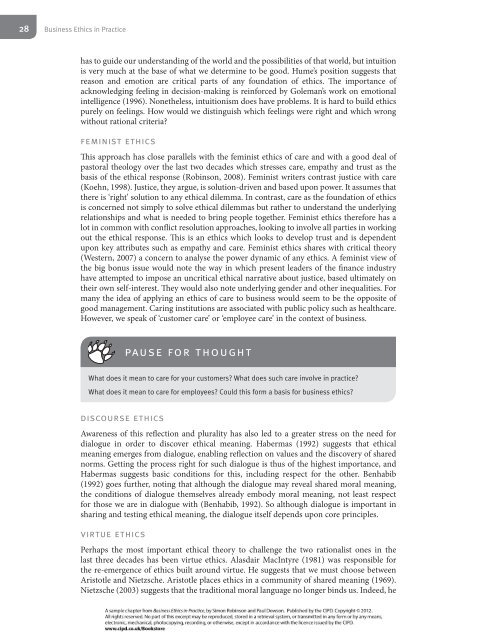normative Ethical theory - CIPD
normative Ethical theory - CIPD
normative Ethical theory - CIPD
You also want an ePaper? Increase the reach of your titles
YUMPU automatically turns print PDFs into web optimized ePapers that Google loves.
28Business Ethics in Practicehas to guide our understanding of the world and the possibilities of that world, but intuitionis very much at the base of what we determine to be good. Hume’s position suggests thatreason and emotion are critical parts of any foundation of ethics. The importance ofacknowledging feeling in decision-making is reinforced by Goleman’s work on emotionalintelligence (1996). Nonetheless, intuitionism does have problems. It is hard to build ethicspurely on feelings. How would we distinguish which feelings were right and which wrongwithout rational criteria?feminist ethicsThis approach has close parallels with the feminist ethics of care and with a good deal ofpastoral theology over the last two decades which stresses care, empathy and trust as thebasis of the ethical response (Robinson, 2008). Feminist writers contrast justice with care(Koehn, 1998). Justice, they argue, is solution-driven and based upon power. It assumes thatthere is ‘right’ solution to any ethical dilemma. In contrast, care as the foundation of ethicsis concerned not simply to solve ethical dilemmas but rather to understand the underlyingrelationships and what is needed to bring people together. Feminist ethics therefore has alot in common with conflict resolution approaches, looking to involve all parties in workingout the ethical response. This is an ethics which looks to develop trust and is dependentupon key attributes such as empathy and care. Feminist ethics shares with critical <strong>theory</strong>(Western, 2007) a concern to analyse the power dynamic of any ethics. A feminist view ofthe big bonus issue would note the way in which present leaders of the finance industryhave attempted to impose an uncritical ethical narrative about justice, based ultimately ontheir own self-interest. They would also note underlying gender and other inequalities. Formany the idea of applying an ethics of care to business would seem to be the opposite ofgood management. Caring institutions are associated with public policy such as healthcare.However, we speak of ‘customer care’ or ‘employee care’ in the context of business.pause for thoughtWhat does it mean to care for your customers? What does such care involve in practice?What does it mean to care for employees? Could this form a basis for business ethics?discourse ethicsAwareness of this reflection and plurality has also led to a greater stress on the need fordialogue in order to discover ethical meaning. Habermas (1992) suggests that ethicalmeaning emerges from dialogue, enabling reflection on values and the discovery of sharednorms. Getting the process right for such dialogue is thus of the highest importance, andHabermas suggests basic conditions for this, including respect for the other. Benhabib(1992) goes further, noting that although the dialogue may reveal shared moral meaning,the conditions of dialogue themselves already embody moral meaning, not least respectfor those we are in dialogue with (Benhabib, 1992). So although dialogue is important insharing and testing ethical meaning, the dialogue itself depends upon core principles.virtue ethicsPerhaps the most important ethical <strong>theory</strong> to challenge the two rationalist ones in thelast three decades has been virtue ethics. Alasdair MacIntyre (1981) was responsible forthe re-emergence of ethics built around virtue. He suggests that we must choose betweenAristotle and Nietzsche. Aristotle places ethics in a community of shared meaning (1969).Nietzsche (2003) suggests that the traditional moral language no longer binds us. Indeed, he

















